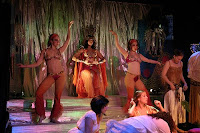Imagination Compact Artists Reveal #21–Jeff Lewonczyk
 What is The Imagination Compact?
What is The Imagination Compact?
And how can I learn more about Flux’s Midsummer?
Jeff Lewonczyk
Playwright, The Royals, May 12th
(None of the women above are, in fact, the Jeff Lewonczyk. All three do, however, appear in his play Babylon, Babylon, which you should see.)
1. What is your favorite Shakespeare play?
I’ve always felt like my favorite Shakespeare play is one that I haven’t read yet, maybe even one that hasn’t been discovered or doesn’t exist. I’ve stopped reading any Shakespeare plays that I’m not already familiar with, so I can have the opportunity to discover them onstage first. It’s nice to leave something unknown to look forward to.
2. What is your favorite line of text?
Weirdly for a writer, I’m bad with quotations. Though when I look at something like the “Tomorrow and tomorrow and tomorrow” speech from Macbeth, and see that pretty much every line in it has been used as a title for something else, I’m pretty damn impressed.
3. Does Shakespeare influence your writing at all?
I mean, God, of course. Last year I directed a show called Macbeth Without Words, which was, sure enough, true to the title – a dance- and silent film-inspired reimagining of the play. I ended up getting quoted in the Times dissing Shakespeare, which was partly an exponent of the cheeky context in which I was speaking (as one of the producers of the Brick Theater’s Pretentious Festival), but also with a grain of truth: I don’t think any writer, even one as great as Shakespeare, should be forced to endure the mantle of perfection and supremacy that’s been dropped on his shoulders. I find his poetry as fusty and obnoxious in certain places as I find it beautiful and indispensable in others. But what I’m most indebted to/in awe of in Shakespeare is his scope and audacity – how could anybody write such big plays about such big things and stay sane? This is partly a result of the Elizabethan dramaturgical tradition – all the reflective sub-plots, cascading scene structures, and jumbles of disparate elements, comic and tragic alike – but Shakespeare did some incredible things with the style of his times, things that I think still serve as boundaries for us to explore and, perhaps eventually, surpass.
4. If you had to date one of the Midsummer lovers, whom would you date and why?
Helena, no question. Hermia’s a brat, and though she may be more superficially sane than her counterpart, I’ve always felt that Helena hid greater depths – like, once she got her shit together, she’d be way more interesting to go out with – and, yes, settle down with, etc. Also, my wife played Helena in high school, and I know which side my bread is buttered on.
3. Fairies: colorful playmates or dangerous tricksters?
Why must we choose?
4. If the Flux Capacitor made time travel possible when the DeLorean reached 88mph, what do you think would happen if Flux Theatre Ensemble got theatre up to 88mph?
If it were trying to do so on, say, the Taconic Parkway, it would most likely get heavily ticketed, as happened to me several times in college. And once the cops found the plutonium in the trunk, forget it. This is why so many of us make theatre in New York City – fewer State Troopers, and much easier access to plutonium.
5. If a capricious fairy turned you into an animal against your will, what animal would you be and why?
I obviously wouldn’t have much say in the matter, so I’d have to say a jellyfish, because really, I have no interest whatsoever in being a jellyfish. They’re gross.
6. Which would win in a fight – the forest of Midsummer or the forest of Arden?
Depends on the rules of the fight. In a public, televised, heavily refereed fight I think the forest of Arden would win – it’s the “good guy” forest, and it plays fair. But if we’re talking a back-alley bare-knuckle altercation, with no one else around, the Midsummer forest would wipe the concrete with Arden. I would not unduly provoke the Midsummer forest.




Recent Comments